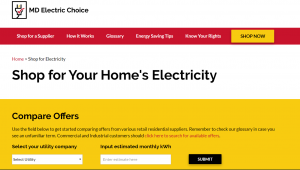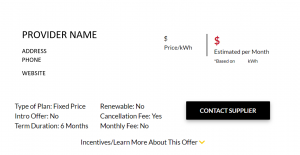In these challenging times, check before you sign up for an electric plan
By Greg Williams, Senior Energy Adviser
Our state is in the grips of the COVID-19 global pandemic that is stressing our healthcare system, killing our fellow Marylanders, and forcing some 300,000 people to file for unemployment. Financial pressure due to a lost job and / or diminished income as a result of an economy grinding to a sudden halt is at an all time high. As an individual who once had to rely on unemployment to survive, I know how you have to make difficult choices to make ends meet and pay your bills. Unfortunately times like this are also when certain people and companies may take advantage of people by selling or marketing a product under false pretenses. As the saying goes, “Some people just are not who they claim to be, so you better keep your guard up at all times to avoid getting hurt.” Scams run the gamut but the people I am referring to are what we call energy “slammers.” These people represent third party energy companies who engage in the unauthorized switching of your electric service from one company to another company. Slammers either call or go door-to-door and pose as an authorized representative of your local utility company. In Maryland, this practice is illegal.
In April of 1999, then Maryland Governor Parris Glendening signed into law the Electric Customer Choice and Competition Act of 1999, which deregulated the energy market in the state and allowed Maryland residents to choose their own supplier or generator for their respective energy needs from a variety of third-party suppliers. The intended purpose of this legislation was to spark competition and lower energy bills across the state. While the goal of the law was admirable, the unintended consequence of this law was that it also opened the door to some unscrupulous business practices. In fact, late last year, the Maryland Public Service Commission (PSC) levied a fine against an energy supplier, Smart One Energy, for its unfair and deceptive marketing practices. A natural gas company, Smart One Energy based out of New York and were licensed to operate in Maryland. The PSC, stated in their press release, suspended Smart One Energy’s license and imposed a civil penalty on the company for $561,000 – which is the largest civil penalty ever levied against a retail energy supplier in the state. Smart One Energy was proved to have enrolled customers without a signed contract, failing to provide a contract summary to its customers, and engaged in deceptive solicitations. Currently, there are 16 states and the District of Columbia who have deregulated their respective energy markets and this has spawned an era of door-to-door or call center based energy salespeople. Some are legitimate and some are not.
Marylanders are fortunate to have access to many ethical and reliable energy providers. There are over 30 alone in the Baltimore Gas and Electric (BGE) territory. Make sure you are contracting with an upstanding energy provider, check the PSC’s official website for approved providers.
In this time of social distancing, no one should be visiting your home for energy sales. However, call centers are operating. How can you avoid becoming a victim of an energy scammer?
Visit the PSC’s official electric choice shopping site to select credible, licensed suppliers and price compare. Be aware, many sites may look similar but the real site is www.MDElectricChoice.com.
If you are contacted by an energy service provider and like their offer, make note of their name search for the provider on www.MDElectricChoice.com. You can use this website to register for offers from authorized providers in your service area or shop around. Do not sign-up on the phone and do not provide any personal information such as your social security number, utility or bank account information.
On the www.MDElectricChoice.com site, you will see a list of providers with contact information, pricing and information on the terms of the service.
Additionally, there is an excellent article, written by Author Murray, from Choose Energy, entitled “A Guide to avoid door-to-door Energy Scams” from December of last year. This article gives the customer a brief history of the energy deregulation of the energy industry and several recommendations on how to avoid being scammed by third party energy suppliers. This is a good resource to have should you receive an unexpected knock on your door or should you receive an unanticipated phone call from someone asking you about your utility bill, you need to use your common sense when dealing with that door-to-door salesmen or phone solicitor. If the offer sounds too good to be true, it probably is a bad investment. Remember, never give any personal information such as your social security number, utility or bank account information to anyone, and always remember the old adage, “buyer beware.”
To help others you may want to report potential scams or poor business practices to your state or local office of consumer protections a list of these offices can be found here. You can also submit a general complaint on an energy supplier to the Maryland Public Service Commission.





 1-888-373-7888
1-888-373-7888 233733
233733